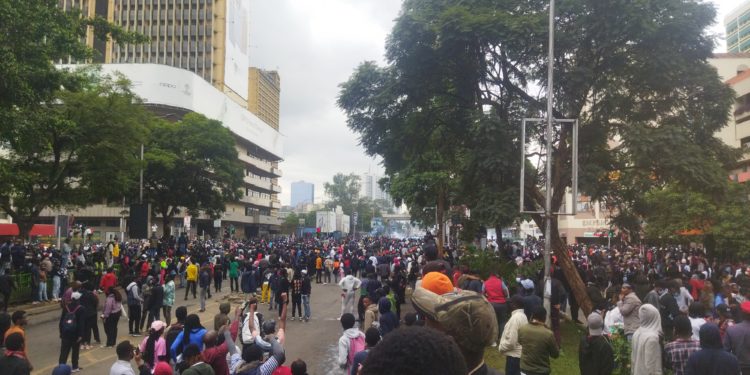The Kenyan government’s ambitious revenue-raising measures, designed to tackle the nation’s budget deficit, are facing significant public opposition and pose potential risks to the living standards of its citizens.
On June 20, 2024, demonstrations erupted across Kenya as citizens protested the Finance Bill 2024/2025, which includes several controversial tax measures aimed at reducing the budget deficit from an estimated 5.7% of GDP in FY’24 to 3.3% in FY’25. Despite the widespread public outcry, the bill advanced to its second reading in Parliament after a majority of legislators voted in favor.
Fitch Ratings, in a recent report, highlighted the challenges the Kenyan government faces in meeting its fiscal targets. The proposed budget aims to reduce expenditure as a percentage of GDP to 22.1%, with recurrent expenditure dropping to 15.7%. However, Fitch remains skeptical, revising its deficit forecast for FY’25 only marginally to 4.3% of GDP, citing Kenya’s historical revenue underperformance and recent backtracking on proposed tax increases.
The government’s initial revenue-raising proposals included repealing tax exemptions on certain financial services and introducing a 2.5% motor vehicle tax. Facing intense social opposition, these measures were withdrawn, prompting the government to focus on enhancing tax revenue through administrative efficiencies. Official statements suggest these withdrawn measures would have contributed around 1.1% of FY’25 GDP.
Public opposition to the Finance Bill underscores the growing dissatisfaction with the government’s fiscal policies. The demonstrations, which saw thousands take to the streets, reflect widespread concerns that increased taxes and spending cuts could disproportionately affect lower-income households and essential public services.
“These new taxes will only make life harder for us,” said a protester in Nairobi. “We already struggle to make ends meet, and now the government wants to take more from us.”
High debt servicing costs add another layer of complexity. Fitch projects that the government interest payments/revenue ratio will remain at 32% in 2025, significantly above the median forecast for ‘B’ category sovereigns. This limits the government’s capacity to invest in social programs and public services, further straining the living standards of ordinary Kenyans.
Economic growth, projected at 5.4% for both 2024 and 2025, could also be at risk if fiscal tightening dampens economic activity. A tighter fiscal stance could slow job creation and wage growth, impacting household incomes and overall economic well-being.
Despite these challenges, the government has made strides in addressing external funding constraints. An international bond issue in February facilitated the buyback of USD 1.44 billion of a USD 2 billion Eurobond maturing on June 24, easing near-term liquidity pressures. Additionally, the World Bank and the IMF have authorized significant funding, further reducing external financing constraints.
The Kenyan shilling has appreciated by about 27% since January 2024, reflecting investor confidence in the government’s efforts. However, sustaining this positive outlook will require balancing fiscal consolidation with the need to protect living standards.
The Negative Outlook on Kenya’s ‘B’ rating, affirmed by Fitch in February, reflects ongoing risks. Achieving fiscal consolidation while maintaining social stability and economic growth remains a delicate balancing act for the government.
As Kenya navigates these fiscal challenges, the impact on the living standards of the common Mwananchi remains a central concern. Public opposition and social unrest highlight the urgent need for policies that address fiscal deficits without disproportionately burdening the most vulnerable citizens.


















